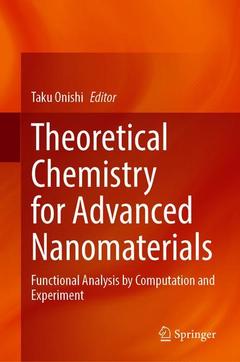Theoretical Chemistry for Advanced Nanomaterials, 1st ed. 2020 Functional Analysis by Computation and Experiment
Coordonnateur : Onishi Taku

This book collects recent topics of theoretical chemistry for advanced nanomaterials from the points of view of both computational and experimental chemistry. It is written for computational and experimental chemists, including undergraduate students, who are working with advanced nanomaterials, where collaboration and interplay between computation and experiment are essential.
After the general introduction of nanomaterials, several computational approaches are explained in Part II. Each chapter presents not only calculation methods but also concrete calculation results for advanced nanomaterials. Hydride ion conducting nanomaterials, high-k dielectric nanomaterials, and organic electronics are focused on. In Part III, the interplay between computational and experimental approaches is explained. The chapters show calculation results, combined with corresponding experimental data. Dimensionality of nanomaterials, electronic structure of oligomers and nanorods, carbon nanomaterials, and the electronic structure of a nanosized sandwich cluster is looked at carefully. In Part IV, functionality analysis is explained from the point of view of the experimental approach. The emphasis is on the mechanism of photoluminescence and hydrogen generation using silicon nanopowder, the superionic conducting mechanism of glass ceramics, nanoclusters formation on the surface of metal oxides, and the magnetic property of an organic one-dimensional nanochannel. Finally, forthcoming theoretical methods for excited states and quantum dynamics are introduced in Part V.
Taku Onishi is Japanese scientist. He graduated from Faculty of Science, Osaka University, Japan in 1998, and got PhD from Graduate School of Science, Osaka University, Japan in 2003. He got a permanent position at Faculty of Engineering, Mie University, Japan in 2003. He has been a guest researcher of Department of Chemistry, University of Oslo, Norway since 2010. His research covers several scientific fields such as computational chemistry, quantum physics and material science. He has served on international scientific activities: Member of Royal Society of Chemistry; Chair of Computational Chemistry (CC) symposium; Science Committee of International Conference of Computational Methods in Sciences and Engineering (ICCMSE); Editorial Board Member of Journal of Computational Methods in Sciences and Engineering (JCMSE), Cogent Chemistry and Cogent Engineering etc.
Date de parution : 02-2020
Ouvrage de 544 p.
15.5x23.5 cm
Date de parution : 08-2021
Ouvrage de 544 p.
15.5x23.5 cm



